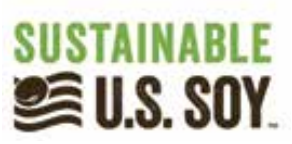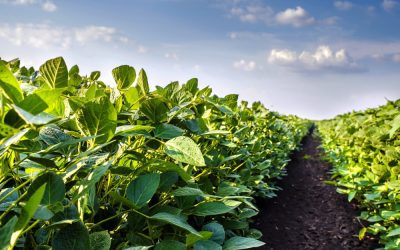Sharing U.S. Soy’s well-earned reputation for sustainability with the world

BY ABBY RINNE, Director of Sustainability, U.S. Soybean Export Council

U.S. soybean farmers consistently manage to produce more with fewer resources, while at the same time supporting a healthy society and preserving the planet. And they are continuously improving. The U.S. Soybean Export Council (USSEC) shares these accomplishments with global customers in many ways. Documenting the sustainability of U.S. Soy helps many customers justify its purchase, adding to its intrinsic value.
USSEC explains how U.S. Soy farmers lead the way in implementing conservation tillage and sustainable precision agriculture. This includes agronomic practices that are common in Indiana, like minimizing soil disturbance, ensuring crop diversity, ensuring the soil remains covered with crop residue or growing plants and integrating livestock. Indiana farmers are increasingly adopting other methods, like maintaining living roots in the soil via cover crops.
As a result, USSEC has been able to show that U.S. Soy has the lowest carbon footprint compared with soy of other origins. This includes minimal land use change, a hot topic globally.
In some regions, soybeans grow on land recently converted to cropland. In contrast, about 15 percent of U.S. farmland is currently set aside for conservation, forest development and wildlife habitat. In fact, non-federal forest land increased more than 1.8 million acres from 1997 to 2017, while cropland decreased nearly 8.9 million acres.
Certificates of Sustainability reassure international U.S. Soy customers that products truly contribute to sustainable development, while also helping to stem challenges of “greenwashing.” Verification of the sustainability of U.S. Soy is provided through the U.S. Soy Sustainability Assurance Protocol (SSAP), a program developed in 2013 to meet international sourcing requirements. It covers all the laws and regulations that U.S. farmers must follow, as well as voluntary on-farm sustainability practices.
The European Feed Manufacturers’ Federation confirmed that the SSAP conforms to their Soy Sourcing Guidelines 2021, including criteria to confirm “conversion-free” soy, or crops produced without the need to convert forestland or natural habitats to farmland. The Consumer Goods Forum’s Sustainable Soy Sourcing Guidelines and the Global Seafood Alliance’s Best Aquaculture Practices, among others, also recognize SSAP as meeting their guidelines.
SSAP certificates can be transferred along the supply chain up to four times. They allow companies to keep records of sustainable U.S. Soy purchases that demonstrate how they are meeting their environmental goals. For the 2022 marketing year, 60 percent of all U.S. Soy exports had an SSAP certificate. The year-over-year growth has been dramatic. Shipments of verified sustainable U.S. Soy have increased from little more than 851,000 metric tons in 2014 to more than 40 million metric tons in 2022.
An increasing number of food companies are adopting the Sustainable U.S. Soy label as they shift towards demonstrating more sustainable supply chains. The logo is currently featured on more than 1,000 stock keeping units (SKUs) from 70 companies across the Americas, Greater China, Northeast Asia and Southeast Asia.
A notable example of this is Ichiban soy milk, which started featuring the Sustainable U.S. Soy logo on soy milk served on non-stop Vietnam Airlines flights from Ho Chi Minh City to San Francisco in late 2022. The manufacturer, ThaiCorp International, can now leverage the logo to generate new sales and marketing opportunities, as consumer demand for sustainable products continues to grow.
Through this emphasis on the sustainability of U.S. Soy, USSEC is building and maintaining preference for these products with key global customers.
Posted: July 19, 2023
Category: Indiana Corn and Soybean Post - Summer 2023, News




